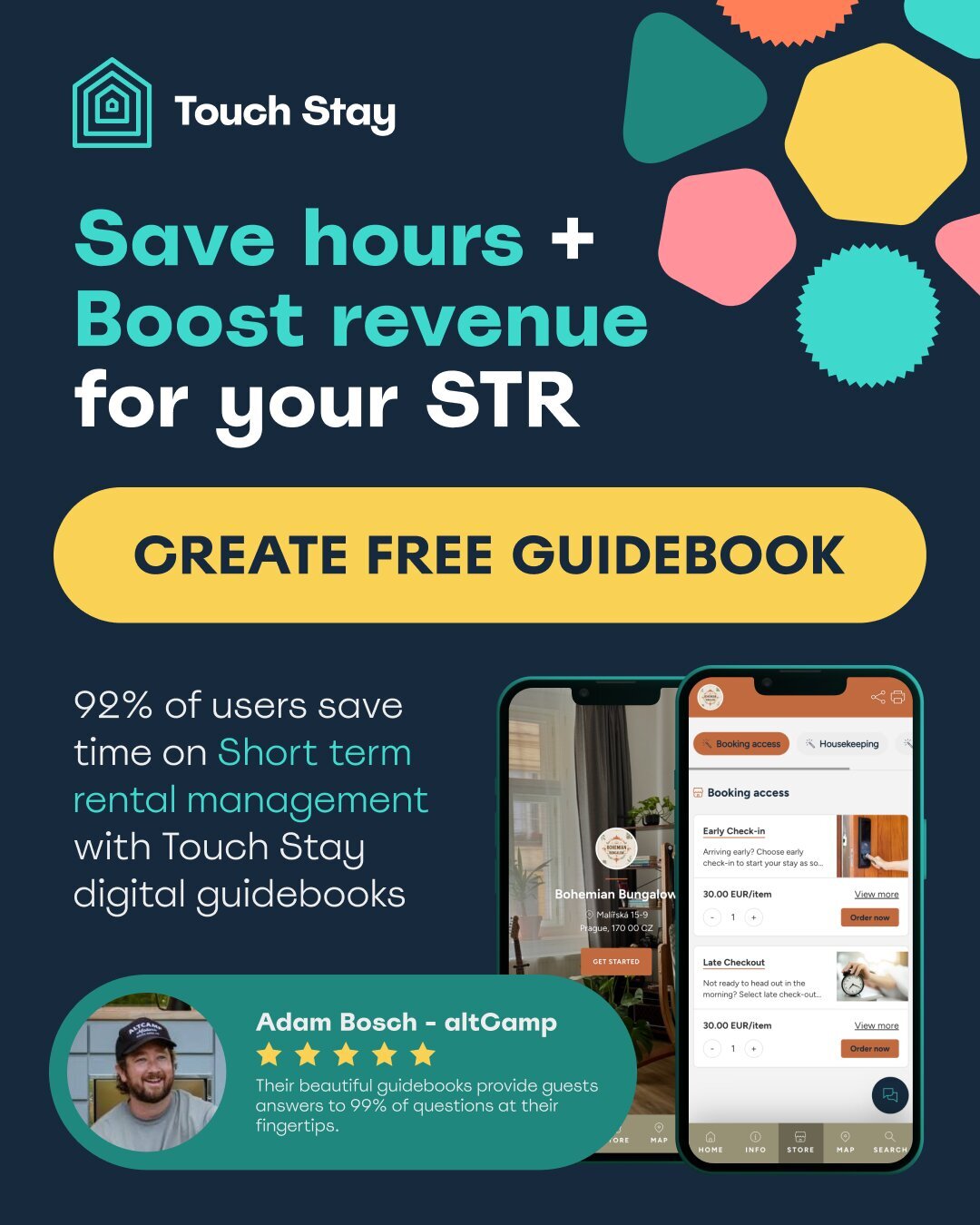Starting a camping business can be an excellent opportunity to combine your love of the outdoors with a profitable venture. With the increasing popularity of nature-based travel, campgrounds offer a reliable income stream for entrepreneurs.
In this comprehensive guide, we’ll cover everything you need to know about how to start a campground business. From market research, creating a memorable guest experience, to using a digital guidebook to streamline the entire process. Follow these steps to turn your camping dreams into reality:
- How profitable is the camping industry?
- Why now is a great time to start a camping business
- Pros and cons of the camping business
- Camping vs. glamping business
- How to start a camping business
- Final thoughts
- FAQs
How profitable is the camping industry?
The camping industry is growing at a steady pace. According to Statista, the global camping market was valued at $38.6 billion in 2025 and is expected to grow further.
Key industry insights:
- Rising popularity: More people are seeking outdoor experiences.
- Low overheads: Campgrounds typically have lower operating costs compared to hotels.
- Seasonal flexibility: You can run a seasonal or year-round business depending on your location.
Why now is a great time to start a camping business
Post-pandemic, travellers are showing a stronger preference for open spaces, reconnecting with nature, and enjoying affordable getaways. Campgrounds offer the perfect combination of affordability and comfort, making them increasingly popular for families, solo travellers, and remote workers.
Furthermore, with the rise of eco-tourism and sustainable travel options, campgrounds that offer responsible and environmentally friendly experiences have a significant advantage in the market.
Just starting your camping business journey? Learn how to open a campground or RV park: a step-by-step guide
Pros and cons of the camping business
Pros
- Low initial investment compared to hotels and resorts.
- Sustainability appeals to eco-conscious travellers.
- Diverse revenue streams through camping fees, amenities, and events.
- Community building among campers.
- Opportunities for expansion such as adding glamping, RV hookups, or nature activities.
Cons
- Weather dependency can affect bookings.
- High maintenance of campground facilities.
- Permits and regulations may vary by location.
- Seasonal income in colder climates.
- Initial infrastructure costs may be significant for large campgrounds.
Camping vs. glamping business
A camping business typically provides traditional tent or RV accommodations with basic amenities. On the other hand, a glamping business (short for glamorous camping) offers luxury accommodations such as yurts, safari tents, or cabins. While traditional camping is often budget-friendly, glamping appeals to a higher-income demographic looking for comfort and unique experiences.
Decided to choose glamping over a camping business? Read our full guide to starting a Glamping Business.
How to start a camping business
1. Perform market and industry analysis
- Identify demand and competition in your desired location.
- Understand your target market (e.g., families, hikers, RV travellers).
- Evaluate local tourism trends.
- Study pricing models from competitors to establish your rates.
- Investigate the seasonal demand and expected occupancy rates.
2. Create a camping business plan
- Define your unique selling proposition (USP).
- Calculate startup and operational costs.
- Include revenue projections and marketing strategies.
- Detail your campground amenities and unique offerings.
- Set clear goals for growth and expansion.
A comprehensive business plan will also help you secure loans or attract investors.
3. Choose the best campground locations
- Consider proximity to national parks, lakes, or tourist attractions.
- Ensure access to essential amenities like water, electricity, and waste disposal.
- Evaluate the terrain for tent pitches, RV parking, and glamping options.
- Think about accessibility for campers with disabilities.
- Research local zoning laws and regulations.
4. Consider costs and fees
- Land purchase or lease: Expect to pay depending on location and land size.
- Permit and licensing fees: Budget for local authority requirements.
- Site development: Grading, electrical, plumbing, and roadwork costs.
- Marketing expenses: Online promotions and local advertisements.
- Operational costs: Staff wages, insurance, and maintenance expenses.
- Utilities and amenities: Power, water, and sewage infrastructure.
5. Understand campground permits and licenses
- Land use permits
- Environmental permits
- Health and safety certifications
- Business operating licenses
- Food service licenses (if providing food on-site)
Check your local government website for exact requirements. Some locations may also require environmental impact assessments if you’re developing previously untouched land.
6. Purchase or rent a campground
- Decide whether to buy existing land or lease property.
- Assess the infrastructure and amenities.
- Negotiate favourable lease or purchase terms.
Look for land that already has utilities, as installing water, electricity, and sewage systems can be costly.
7. Prepare your campground
- Design layouts with clear signage.
- Provide basic amenities like restrooms, showers, and potable water.
- Ensure proper waste management.
- Set up designated fire pits, picnic tables, and BBQ stations.
- Install safety features like first aid stations and fire extinguishers.
- Offer accessible sites for campers with disabilities.
8. Provide camping accessories
- Fire pits and picnic tables
- Outdoor grills
- Electric hookups for RVs
- Basic camping gear rentals
- Offer additional amenities like camp stores for last-minute essentials
Consider partnering with local businesses to provide firewood, rental equipment, or guided activities.
9. Promote your campground business
- List your site on online platforms like Airbnb or Hipcamp.
- Use SEO strategies to rank for keywords like camping business and how to start a campground.
- Leverage social media and influencer partnerships to generate interest.
Pro tip: discover how (and why) to create a digital guidebook for your campsite.
10. Create a unique campground experience
- Offer themed events and workshops.
- Provide guided tours or outdoor activities.
- Incorporate eco-friendly initiatives.
- Organise local partnerships to offer excursions like kayaking or hiking tours.
Touch Stay’s digital guidebooks, designed specially for campgrounds will help campers navigate your site, access local recommendations, and enhance their overall experience.
11. Hire and train your staff
- Hire staff for maintenance, guest services, and security.
- Provide customer service training.
- Ensure safety procedures are well understood.
- Consider using hospitality management software to streamline operations.
Final thoughts
Starting a camping business can be a rewarding venture, both personally and financially. By conducting thorough market research, creating a solid business plan, and providing exceptional guest experiences, your campground can stand out in a competitive market.
With the right management tools like Touch Stay’s digital guidebooks, you can streamline your operations, improve guest satisfaction, and build a strong reputation in the industry. Whether you’re offering rustic camping, RV sites, or luxury glamping experiences, the opportunities are vast in the growing outdoor hospitality sector.
Ready to turbocharge your camping experience?
Frequently asked questions
Yes, campgrounds can be very profitable, especially in tourist-heavy areas. With effective management, annual revenue can range from £30,000 to £300,000 or more.
Yes, campground businesses require permits and licenses that vary depending on your location. Consult local authorities for specific regulations.
The cost to start a campground ranges from £50,000 to £500,000 depending on the size, amenities, and location.

Ned
Ned has clocked up over 11 years in digital marketing and comms, with a strong focus on creating engaging content for a range of brands and agencies. When he’s not writing, he can be found digging for records, peering through his telescope at the night sky, or onboard his local lifeboat where he volunteers as a crewmember.
Be the first to know!
Join our newsletter for early access to:
- ✅ Free guides
- ✅ Pro tips & tricks
- ✅ Time saving tutorials
- ✅ Latest blog posts
- ✅ Checklists & templates





















.webp?width=50)
%20and%20how%20to%20calculate%20it.webp?width=50)